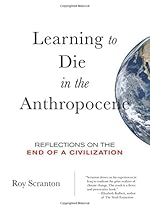Learning to Die in the Anthropocene: Reflections on the End of a Civilization (City Lights Open Media)

| Author | : | |
| Rating | : | 4.11 (863 Votes) |
| Asin | : | 0872866696 |
| Format Type | : | paperback |
| Number of Pages | : | 144 Pages |
| Publish Date | : | 2016-03-27 |
| Language | : | English |
DESCRIPTION:
Life won't help you to live. Ford Huffman, The Military Times"With clarity and conviction, Scranton explores the global failure to address the climate crisis and the possibility that the planet could become uninhabitable. Including ecological awareness in our political decisions means including as much death in as many different modes (psychic, philosophical, social) as we can manage. Scranton doesn’t sugar coat his findings, 'We are f*cked' as he so bluntly puts it. Referring to classic texts as far back as The Epic of Gilgamesh, he urges readers to face their fear of death and find guidance in literature as they prepare for and adapt to the future. It cuts deeper than anything that has yet been written on the subject."--Dale Jamieson<
"A surprisingly beautiful rumination on the inevitable extinction of humanity" according to Nathan Webster. I read this twice before I felt satisfied I could really connect with Roy Scranton's ruminations - but once that switch clicked, I recognized this as about the most beautiful rumination on humanity's eventual extinction that we're likely to read.It's easy to call this a "climate change" book, but Scranton's narrative does. "An excellent introductory polemic on mourning our civilization" according to walterturg. This is a very short introduction to problems of the "Anthropocene" for people willing to face just how dire the situation is. As Scranton's subtitle admits, these are "reflections," although he synthesizes many different sources. The major importance, spread amidst the other arguments, is Scranton's insistence on the imp. Best chapter is Scrantons review of Carbon Politics Best chapter is Scrantons review of Carbon Politics.Tracing the devolution form the Agriculture Revolution to the Industrial Revolution and into the Great Acceleration. Thus mapping how we arrived/ created the Anthropocene. I was a little surprised on his views on Violence and that Violence is inherent to Human behavior a
From war-stricken Baghdad to the melting Arctic, human-caused climate change poses a danger not only to political and economic stability, but to civilization itself and to what it means to be human. It's a powerful, useful, and ultimately hopeful book that more than any other I've read has the ability to change people's minds and create change. For me, it crystallizes and expresses what I've been thinking about and trying to get a grasp on. The result is a fierce and provocative book."--Elizabeth Kolbert, Pulitzer Prize-winning author of The Sixth Extinction: An Unnatural History"Roy Scranton's Learning to Die in the Anthropocene presents, without extraneous bullshit, what we must do to survive on Earth. A critical intervention."--Naomi Klein, author of This Changes Everything: Capitalism vs. Conflict, famine, plagues, and riots menace from every quarter. The warmer, wetter, more chaotic world we now live in--the Anthropocene--demands a radical new vision of human life.In this bracing response to climate change, Roy Scranto
